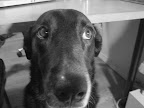I do not regard myself as having opted out of the agony and anxiety that plague men and women who are slaves to lives they did not choose and denizens of communities they hate. I think especially of the citizens of the great industrial and commercial towns -- New York, London, Bombay, and my own Manchester. "In the sweat of thy brow shall thou earn bread": the Book of Genesis says it best. The maintenance of a complex society depends increasingly on routine work, work with no zest or creativity. The things we eat, clothes we wear, places where we live become increasingly standardized, because standardization is the price we pay for the prices we are able to pay.Not sure about the sentimentality for a bygone idyllic natural state this implies but I like how neatly the phrase in bold summarizes a sociopolitical analysis.
Otherwise I found this article by the author about "A Clockwork Orange" somewhat disagreeable, but only because libertarians have made me associate fictional narratives of personal freedom with xenophobia and racism.
The 21st chapter was omitted from the editions published in the United States prior to 1986. In the introduction to the updated American text (these newer editions include the missing 21st chapter), Burgess explains that when he first brought the book to an American publisher, he was told that U.S. audiences would never go for the final chapter, in which Alex sees the error of his ways, decides he has lost all energy for and thrill from violence and resolves to turn his life around (a slow-ripening but classic moment of metanoia—the moment at which one's protagonist realises that everything he thought he knew was wrong).But it was more credibly black:
At the American publisher's insistence, Burgess allowed their editors to cut the redeeming final chapter from the U.S. version, so that the tale would end on a darker note, with Alex succumbing to his violent, reckless nature—an ending which the publisher insisted would be 'more realistic' and appealing to a U.S. audience. The film adaptation, directed by Stanley Kubrick, is based on the American edition of the book (which Burgess considered to be "badly flawed"). Kubrick called Chapter 21 "an extra chapter" and claimed that he had not read the original version until he had virtually finished the screenplay, and that he had never given serious consideration to using it. In Kubrick's opinion, the final chapter was unconvincing and inconsistent with the book.
 |
| Horrorshow! Ha ha ha ha ha |

No comments:
Post a Comment